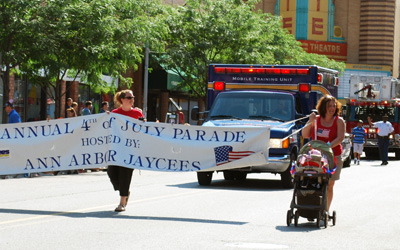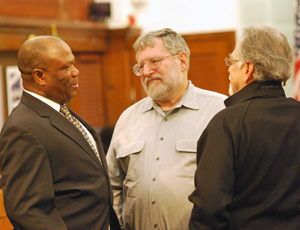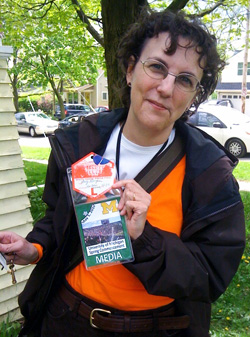Editor’s note: The monthly milestone column, which appears on the second day of each month – the anniversary of The Ann Arbor Chronicle’s Sept. 2, 2008 launch – is an opportunity for either the publisher or the editor of The Chronicle to touch base with readers on topics related to this publication.
It’s also a time that we highlight, with gratitude, our local advertisers, and ask readers to consider subscribing voluntarily to The Chronicle to support our work.
The May meeting of the University of Michigan board of regents was remarkable for a rare display of discord. It’s the only time I can recall that this particular board has publicly voiced disagreement with the administration. It’s the only time I can remember some unscripted debate unfolding among regents on a substantive issue – the issue was a resolution recognizing the right of graduate student research assistants to unionize.

Bezonki, like The Chronicle, is a different kind of beast – he's sometimes surprised by what he reads in the newspaper. This is a preview panel from the upcoming June edition of The Chronicle's comic – a monthly nod to the time-honored tradition of the Sunday funnies. Bezonki is created by local artist Alvey Jones. (Image links to Bezonki archive.)
After the meeting, I happened to be leaving at the same time as UM president Mary Sue Coleman. As we walked down the hall together, I told her that despite the tension and clearly deep disagreement on this issue, I had found it refreshing to see an actual public debate at the meeting. It simply never happens.
Whatever disagreements exist among regents – or between regents and the administration – seem to be aired privately. When tuition rates are set, some regents will read statements of polite disagreement, before casting their votes of dissent. But most action items are approved unanimously, with little if any comment. I told Coleman that I realized the meeting had been at times uncomfortable, but that I appreciated the debate.
She gave me a withering look. “I’m sure you do,” she said, crisply.
Her pointed disdain took me aback – though I should have seen it coming. From her perspective, she’d been delivered a very public defeat on an issue she is passionate about, grounded in her personal experience. She seemed weary. But her comment also revealed a view of the media that’s more prevalent and more justified than I like to admit. It’s a view of reporters as hungering for headline-grabbing, website-traffic-sucking stories – and if the facts don’t quite deliver the juice, well, there are ways to spice up reality. There’s a reason why news gathering is sometimes called “feeding the beast.”
From that perspective, Coleman perhaps heard my remarks as the comments of someone who was hungry for more drama of regents mixing it up in front of the plebeians. Ouch.
So on my drive home from UM’s Dearborn campus – where the regents meeting was held – I thought about why the exchange had touched a nerve for me. For one, I’m dismayed that elected officials and other civic leaders are so often reluctant to hold difficult discussions in public. The board of regents is not the only body that does its business like a tightly choreographed kabuki dance. But as a journalist, I’m angered when irresponsible actions by those who earn a livelihood as part of the news media give public bodies a cheap excuse to be even more closed-off. [Full Story]








